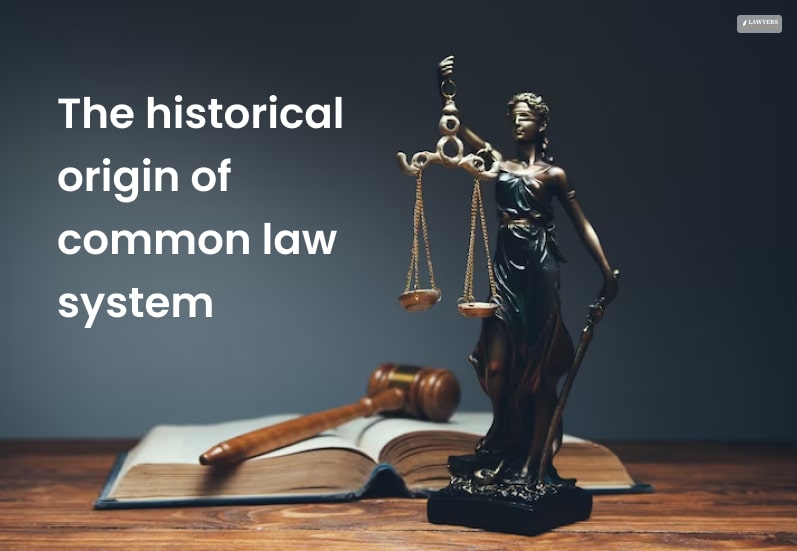
Legal systems across the world are divided into two major categories: common law and civil law.
One hundred fifty nations around the world are noted to follow the civil law system. At the same time, approximately 80 nations are known to follow common law systems. There is a basic distinction between both legal systems.
Common law systems provide significance to opinions developed by the court. On the other hand, civil law systems prioritize codified legislation.
The Historical Origin of Common Law System

The “English Crown” has been recognized for its capacity to issue orders, which are “writs.”
These writs issued by the Crown have been the grounds of common law systems. With time, writs were not enough to cover all situations.
Due to this, equity courts were established to hear cases and provide solutions to issues. The solutions that equity courts presented were based on the principles of Roman law and natural laws.
For equity courts, seeking precedential opinions to resolve current cases became feasible.
These precedents from previous cases began to be recorded and published with time. This led to the origins of common law systems.
What is Common Law?

Common law is a body of unwritten laws based on legal precedents established by the court of law.
Common law is usually used when judgment to a case cannot be based on existing legal statutes.
The US legal system follows the common law system, which evolved from British colonialism within the region. Common law is also known as case law, which is based on unwritten laws based on precedents that the court establishes.
This legal system also derives its opinions from institutionalized opinions and interpretations from judicial authorities and public juries.
Moreover, common law has been characterized by its capacity to inspire new legislation for the greater good.
A precedent widely used in common law systems is “stare decisis.”
This is a history of judicial decisions that form the basis of evaluating a case based on a previous judgment.
Within common law systems, the judge presiding within the court is responsible for determining the appropriate precedent applicable in judging a particular case.
In various cases, it has been noted that higher court judgments are binding on lower court cases. The prevalence of this resulted in the US legal system having stability and consistency.
However, lower courts can deviate from the precedents of higher courts in certain circumstances. This is when precedents passed by higher courts are obsolete.
Moreover, it is rare for a lower court to overturn precedents established in higher courts.
What is Civil Law?

Civil law is a body of written codes that a written Constitution governs.
Civil legal systems are administered by the presence of Codes that govern a variety of legal perspectives. This includes civil codes, criminal codes, and codes that govern corporate, tax administration, and constitutional laws.
These codes are known to enshrine the basic rights and duties of citizens. Legislative sanctions are considered to be universally binding. Due to this, civil, criminal, and commercial courts have judges limited opportunity to use stare decisis or judge-made laws.
However, judges in civil legal systems can follow earlier made judgments.
Constitutional and administrative courts can discredit laws and enactments within civil legal systems. Due to this, the rulings of these two courts are universally binding.
Civil law systems have distinctive courts based on various laws. This means constitutional, administrative, and civil courts are compatible with legislation and administrative acts.
These courts are also recognized for their ability to comply with and interpret the underlying codes.
Common Law VS Civil Law: Understanding the Difference
Civil legal systems are defined by the comprehensive and codified legal statutes that legislators formulate.
This means the civil legal system clearly defines the issues that could be tried in court, procedures that could handle claims, and offenses that are punishable by law.
Moreover, within civil law systems, judicial authorities use the conditions with the applicable code to evaluate facts associated with cases and develop appropriate legislative decisions.
Another feature associated with civil law is its capacity to conduct continuous upgrades. This is because the civil legal system aims to develop standardized codes to create order.
Additionally, the occurrence of bias in legal systems regarding the differentiated application of codes to various cases should be restricted.
On the other hand, common law systems derive institutionalized viewpoints and interpretations from judicial courts and juries when judging a case.
Compared with civil law, common law aims to establish outcomes associated with interpreting legal clauses.
However, as common law depends on precedents, traditional jurisdictions could vary from one district to another.
For instance, a case regarding the legality of marriage might be decided on different grounds within Texas compared to California. This is because these regions have different precedents regarding the legality of marriage.
Due to this, common law factors might differ from one region to another.
However, compared to civil law has universal binding powers that allow judicial authorities to provide judgment based on existing codes and statutes.
Common Law VS Civil Law: Role of judges and lawyers in the Legal Systems!
Both civil and common law systems have a distinctive role that the judge and the attorneys play.
Nations governed by civil law have judges, who are characterized as investigators.
Role of Judges in Common Law and Civil Law
Civil law judges provide action by bringing charges, verifying facts, examining witnesses, and applying legal codes to resolve cases.
Lawyers in the civil system advocate for clients in civil procedures, although their position is not obvious.
However, within common law settings, lawyers are observed for their capacity to assist their clients regarding legal matters and develop petitions submitted to the court of law.
Civil law systems also differ from common law regimes, as they reduce the prioritization to debate orally and provide in-court presentations and active lawyering skills.
Civil laws also allow non-litigation activities like drafting legal documents and writing wills to be delegated to quasi-legal professionals.
They assist organizations and individuals in legal drafting. However, such professionals do not have appropriate university-accredited law degrees or licenses for operating the courts.
Role of Judges in Common Law and Civil Law

On the other hand, common law systems prioritize the presentations made by attorneys toward judges.
Moreover, lawyers in common law systems can also question witnesses to build facts for a case.
Procedures within the common law system are referred to judges, who have increased discretion in building solutions at the end of cases in court compared to civil law systems.
Moreover, lawyers in common law systems also play a role by appearing in court to pursue common men, pursuing them in legal issues, and making them participate in judicial proceedings.
This means that attorneys within this legal system actively participate in judicial activities.
On the contrary, unlike civil legal systems, it is unacceptable and illegal for anyone except licensed lawyers to present legal documentation in courts of law for others within common law regimes.
Furthermore, lawyers, irrespective of their area of operation, play a major role in the settlement of conflict formally. However, the duties and responsibilities of an attorney differ within the two distinctive legal systems.
This means that outside the judicial premises, common law enables the handling of legal matters by a qualified lawyer.
On the other hand, civil legal systems are noted to make qualified laymen handle legal cases.
Nations Governed by Common and Civil Legal Systems
Nations governed by civil laws are generally past colonies ruled by the French, Dutch, German, Spanish, or Portuguese.
These nations usually envelop regions across Central and South America. Along with this, regions within Central and Eastern Europe and East Asian nations follow civil laws. These include:
- China
- Japan
- Germany
- France
Nations that are known to follow the common law system are noted to be former colonies ruled by the British. Additionally, territories with similar cultures were inspired by the British. These regions include:
- United States
- United Kingdom
- India
- Canada
Conclusion
The difference between common and civil law is based on the process they follow in providing solutions to legal cases.
Both legal systems aim to resolve legal matters with distinctive methods.
Both common and civil law lead to similar resolutions due to the principles and values of both legal systems being similar to a wide extent.
Read More:
- 7 Scenarios You Need A Divorce Lawyer For Your Broken Marriage
- Navigating the Labyrinth: A Guide to FDA Lawyers and Their World
- Do I Need A Tampa Car Accident Lawyer?











4 Reply
tornado cahs
April 15, 2024 at 7:04 pm
TornadoCash: Your shield against surveillance on the blockchain. Explore the power of privacy with decentralized transactions
ReplyTop 10 Best Law Firms In New York In 2023
August 17, 2023 at 7:25 am
[…] Differences between common law vs civil law […]
Replyhttps://www.beautifuldollsblog.com/what-is-pantyhose-fetish-a-comprehensive-guide hot pantyhose XXX movies
June 17, 2023 at 12:34 am
Making use of a sex doll is not as taboo since it once had been. There is a multi-billion buck sector around the development and distribution of advanced and not-so-sophisticated intercourse dolls. The term, True Doll offers turn out to be broadly recognized and part of the mainstream vocabulary as new materials and technologies create the impossible, probable. While males can nevertheless completely appreciate standard whack up intercourse dolls, today we see significantly a lot more detailed and superior versions all the time technologically. Metal Man, consume your heart out.
Replyדירות דיסקרטיות בראשון לציון
June 8, 2023 at 8:36 am
You need to be a part of a contest for one of the highest quality blogs online. Im going to recommend this web site!
Reply